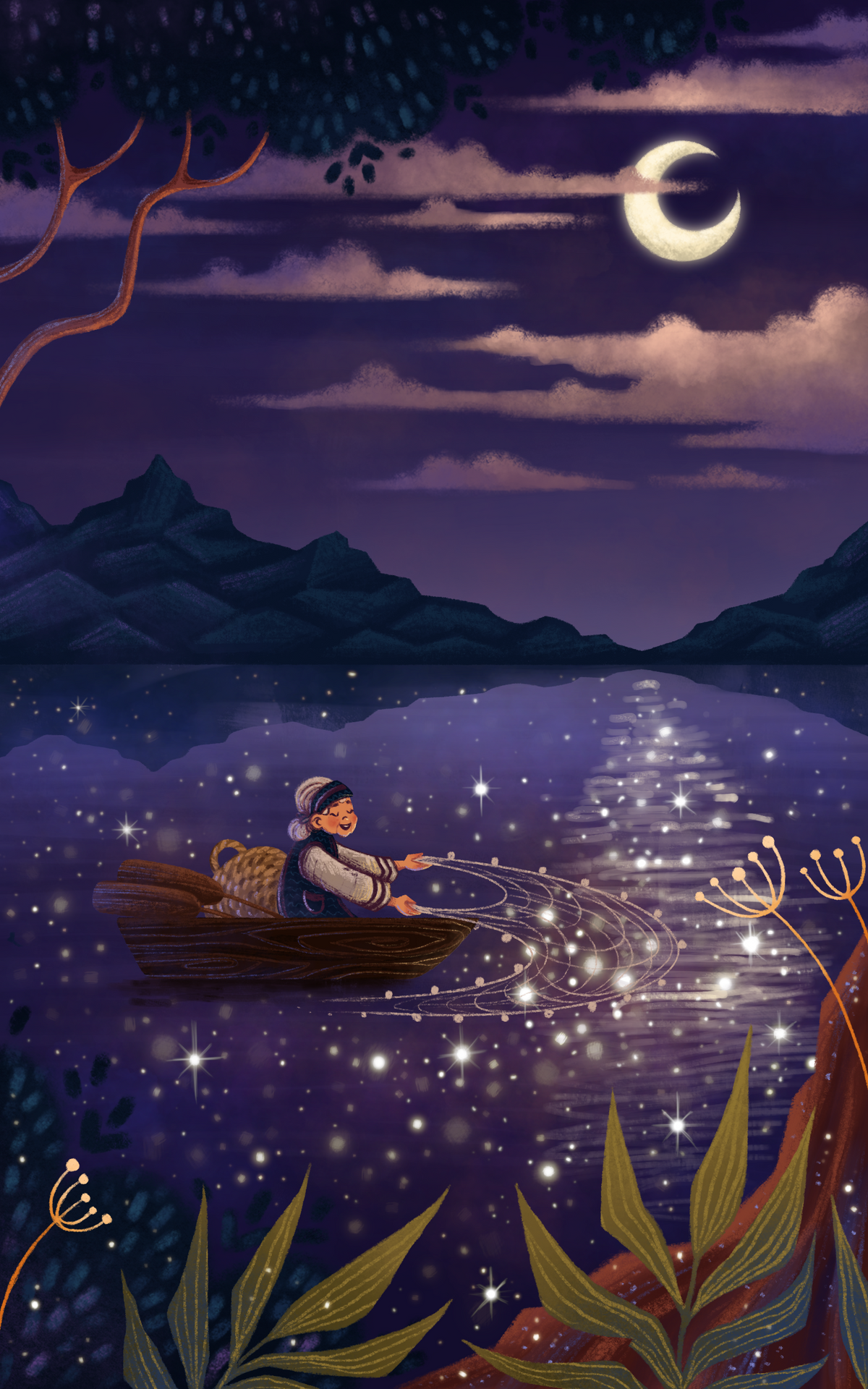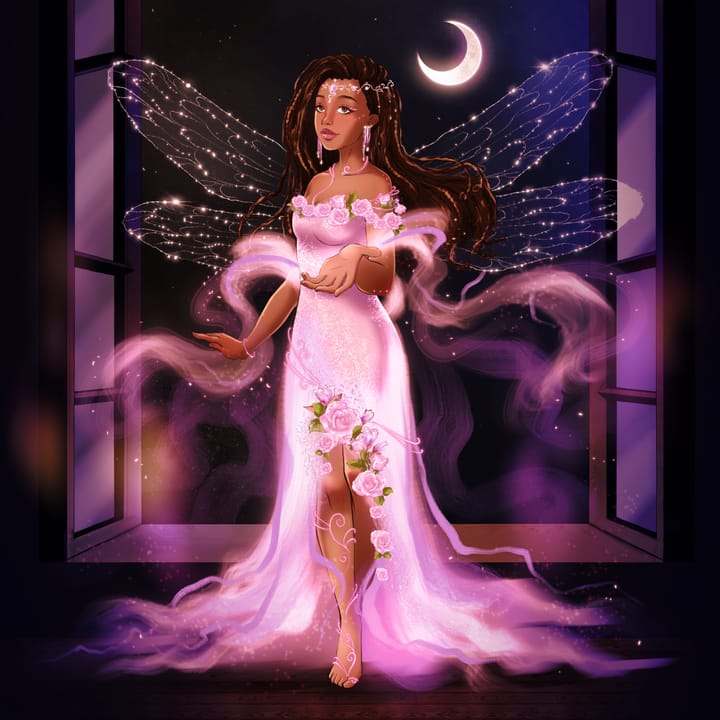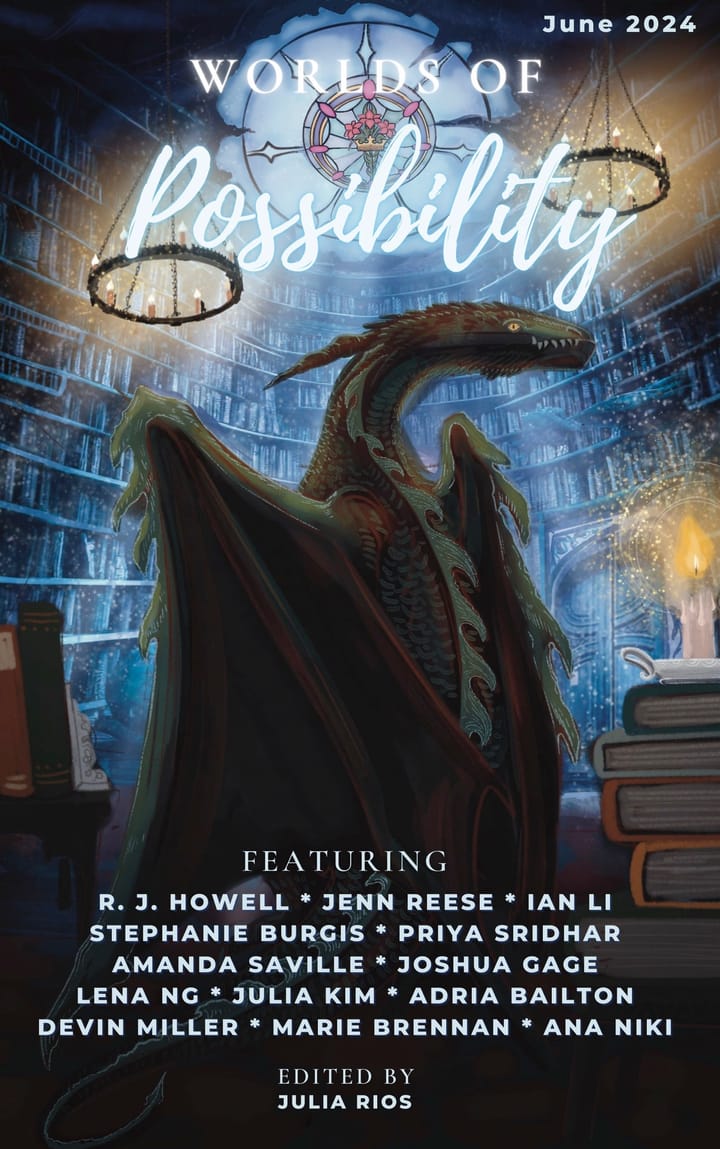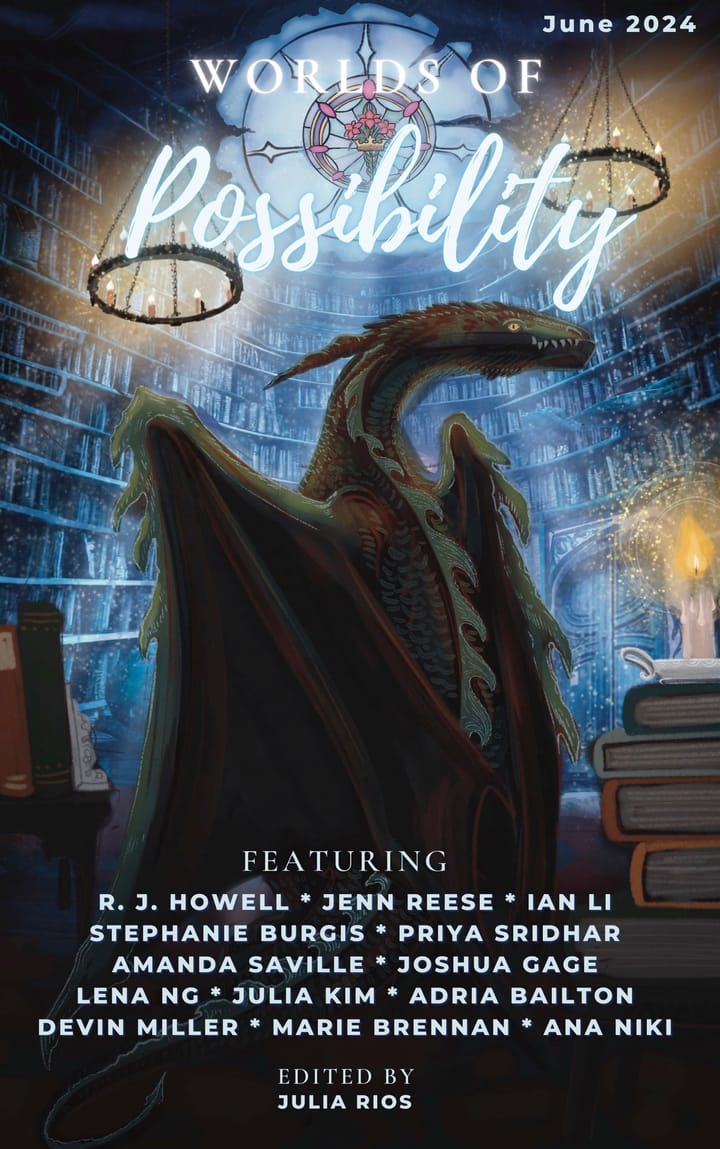Between the Storms: a story by Jennifer Hudak
The first storm always shook the stars from the sky; the second flung them back into place. Between the storms, stars glittered in the lake.

This story originally appeared in the December 2022 issue of Worlds of Possibility. You can listen to me narrate an audio version of this story on Spreaker as part of the OMG Julia Podcast, and you can also read the full text below.
Listen to "Between the Storms - a story by Jennifer Hudak" on Spreaker.
If you are reading this on the day it's released (Monday, May 8, 2023), you still have time to get the early bird discount on the stickers, postcards, and print version of the Worlds of Possibility anthology! You can save $10, but that discount ends at midnight Eastern US time!
I'm releasing this story today because we reached 50% on the Worlds of Possibility anthology Kickstarter! I especially wanted to show you this one so that you could get a taste of how this anthology will be even more exciting than the ebook issues. Since I decided to do a full color print version, I've been working with a lot of stock art to make the inside colorful throughout, and not just on the pages where original illustrations appear. Normally, I don't publish stories online with these decorations, and they also don't go into the single issue ebooks, but I wanted to give you a taste of what you'll see in the ebook and print version of the anthology.
Between the Storms
by Jennifer Hudak

The first storm always shook the stars from the sky; the second flung them back into place. Between the storms, stars glittered in the lake. Helena rowed out in her small boat and dragged her net through the water, skimming up fish and stars alike.
The Goddess watched Helena slip soundlessly through the water. Normally, only children dared to be in the lake between the storms, and even they stayed near the shore, where they splashed and played. The individual children changed from year to year, but as a group, they were as constant as the storms themselves, marking time as predictably as the phases of the moon. Adults, on the other hand, tended to stay inland. The Goddess couldn’t blame them. You had to be careful going out on the lake on nights like these, when water and sky swapped places. It would be easy to forget which way was up and which way was down. It would be easy to lose yourself completely.
Yet Helena was here, surrounded by stars, and unafraid. This was clearly not her first time venturing out between the storms. The Goddess realized that at some point, she’d grown accustomed to Helena’s quiet presence.
The Goddess had known Helena since infancy, when her parents had introduced them by dipping their baby’s toes in the cool water. A lifetime had passed since then. Now, Helena was the oldest fisherwoman in the village, and had long since earned the right to retire her oars. Of course, the Goddess measured time in larger increments; years passed by like ripples on the shore, one after the other, with little to distinguish them. But now that she noticed Helena — her net dipping down and lifting up over and over again — the texture of the night felt different.
The Goddess loomed over Helena’s boat, a suggestion in the darkness. Her toes plunged deep into sand and silt and her head brushed the heavens, but her voice was kind and curious. “Why are you here, Helena?” she asked.
Helena gestured at the children, whose eager voices echoed through the darkness. “I’m not the only one out.”
The Goddess sighed deeply enough to send ripples across the surface of the lake. “The rest of the villagers will be out in their boats tomorrow, after the second storm passes. There will be plenty of fish then. Besides, you are old enough to rest.”
“So are you.”
“Perhaps,” acknowledged the Goddess. “But you’re not here for the fish, are you?”
Helena skimmed another net full of stars out of the water. “No, I’m not.”
“Why bother gathering stars? They’re as common as pebbles.”
“I wouldn’t expect you to understand,” said Helena quietly.
“You can’t eat them, nor burn them for fuel,” pressed the Goddess. “They’re too brittle for building, and too plentiful to signify wealth. Only the children seem to care about them at all. The children, and you.”
Helena stowed the net under her seat and readied her oar. “If you want to see, you’ll have to come to the village.”
The Goddess watched Helena row back to shore. She’d been the Goddess of the lake since before humans even arrived on these shores, before the land was cleared and the shelters built and the soil cultivated for crops. She’d watched generations of villagers bathe and drink and fish in her waters; she celebrated their births and mourned their passing, and knew each of them by name. But she’d never set foot in the village itself. She’d never needed to. Her place was in the lake. When the villagers needed her, they came to her shores. Otherwise, she served the same purpose she’d been serving for millennia: to bring the storms. To wipe clean the sky, and to draw and redraw the familiar constellations.
But she wondered, now, if that was truly her only purpose. She wondered if she knew Helena as well as she thought she did. If she knew any of them, really. She wondered what they hid in their homes, and in their hearts.

The Goddess waited until deep into the night before leaving the water. She became a human-sized shadow to walk in the village, although she needn’t have bothered; at this time of night, with the second storm imminent, the roads were nearly empty. She hadn’t walked anywhere in centuries, so she took her time on the path leading into the village, getting used to the feeling of dry earth, rather than silt, beneath her feet. How strange it felt to gaze up at the rooftops instead of down! How strange to be able to see the sky and yet not touch it!
In the full dark, a silvery glow led the goddess to a house on the edge of the village. There, just outside the house, Helena stood with a bucket of clay and a basket of stars, repairing a glittering statue.
“What is it?” the Goddess asked.
Helena smoothed some clay and pressed in a line of stars. “Last year, it was a horse. The year before that, a dragon. This year…” Helena stood back and regarded the statue. “This year, I think it’s going to be a fish.”
Perhaps this was Helena’s purpose, just as bringing the storms was the Goddess’s. Except, the Goddess knew that Helena was a fisherwoman, not a sculptor. After a certain number of years, all the village elders were allowed to release their obligations, in gratitude for all they’d accomplished during their human-sized lives. Helena had certainly reached that point.
She had chosen this, instead. She had chosen to gather stars, and to create beauty between the storms.
The Goddess could see the statue taking rough shape beneath Helena’s sure hands: the curve of a tail, the suggestion of scales. To think that no one would see it, other than Helena — and now, the Goddess herself.
“Why do you keep building it, when you know the storms will destroy it?”
“It’s never destroyed,” Helena said. “Not completely. It’s just ... reshaped.”
“I can’t stop making the storms,” the Goddess said with regret. “Not even to preserve your work.”
“Why not?”
“I need to shake loose the stars every so often, to create the possibility for new growth. Otherwise, the heavens will become cluttered. Stagnant.”
“None of us wants to be stagnant. Even those of us who no longer need to fish. Who are supposed to do nothing but rest,” Helena said meaningfully. She plunged her hand into the basket and sifted stars through her fingers.
The Goddess ran her hand over the statue. Looking at it now, she recognized the beauty in its rain-crumbled edges and wind-gouged sides. She saw the way Helena’s careful repairs worked with the storm’s damage, not against it, preserving its history in layer upon layer of clay.
It was nearly dawn before Helena stood back and looked at her work. The fish she’d created glittered with starlight, as if it were swimming through the sky.
“There,” Helena said. “It’s done.”
The Goddess circled round the statue, examining it from every angle. “It’s perfect.”
“For now,” said Helena. “It’s nearly time for the second storm, isn’t it?”
“It is.”
“Then I should be getting inside.” Helena took a step toward her house, then turned back. She reached into her basket and pulled out one final star; when she pressed it into the fish’s tail, the whorls of her thumbprint remained.

When the Goddess returned to the lake, she swirled her fingers through the stars murmurating on the surface. Then, she dug her toes into the earth and reached her head up toward the heavens, and brought the second storm.
She whipped the winds into a frenzy and pushed the waters over their breakwalls and flung the stars back into the sky. In the village, the rain bludgeoned the statue, re-sculpting its curves and angles. The Goddess had told Helena that she couldn’t hold back the storms to save her statue, and she meant it. She hoped Helena would see something lovely in the remains.
She also hoped Helena would look at the stars the next evening. While most of them had settled back into their comfortable constellations, the Goddess had reserved a scattering to draw a new picture in the sky: an old woman, holding a net glittering with stars. You’d have to squint to see it, for the Goddess had not created a new constellation in millennia, but she was pleased all the same.
Slipping back into the water, she fell asleep, and dreamed about what she’d make the next time she shook loose the stars, when the night sky became a blank canvas again. When she and Helena alone would be awake between the storms, creating something new for themselves, and for the world.

About the Author
Jennifer Hudak is a speculative fiction writer fueled mostly by tea. Her work has appeared on both the Locus Magazine and the SFWA recommended reading lists, and has been twice nominated for a Pushcart Prize. Originally from Boston, she now lives with her family in Upstate New York where she teaches yoga, knits pocket-sized animals, and misses the ocean. Find out more about her on her website, JenniferHudakWrites.com.
About the Artist
Olha Melnyk is an artist from Ukraine.
Support Worlds of Possibility
Normally this is the place where I ask reader to consider picking up a paid subscription to this website, but right now, the best way to support Worlds of Possibility is to pledge to the Kickstarter. If you've already pledged, or can't afford to pledge, you can show your support by sharing the Kickstarter link on social media, or directly with anyone you think might be interested.
May is my birthday month, and I chose to run the Worlds of Possibility Kickstarter in the weeks before my birthday because I want to make this month a big celebration. Stay tuned for more posts! Next we'll have another public story, but this time, it's going to be one no one's seen yet! It's from the June 2023 issue, and I'll be making that one public once we reach 75% of the funding goal!


